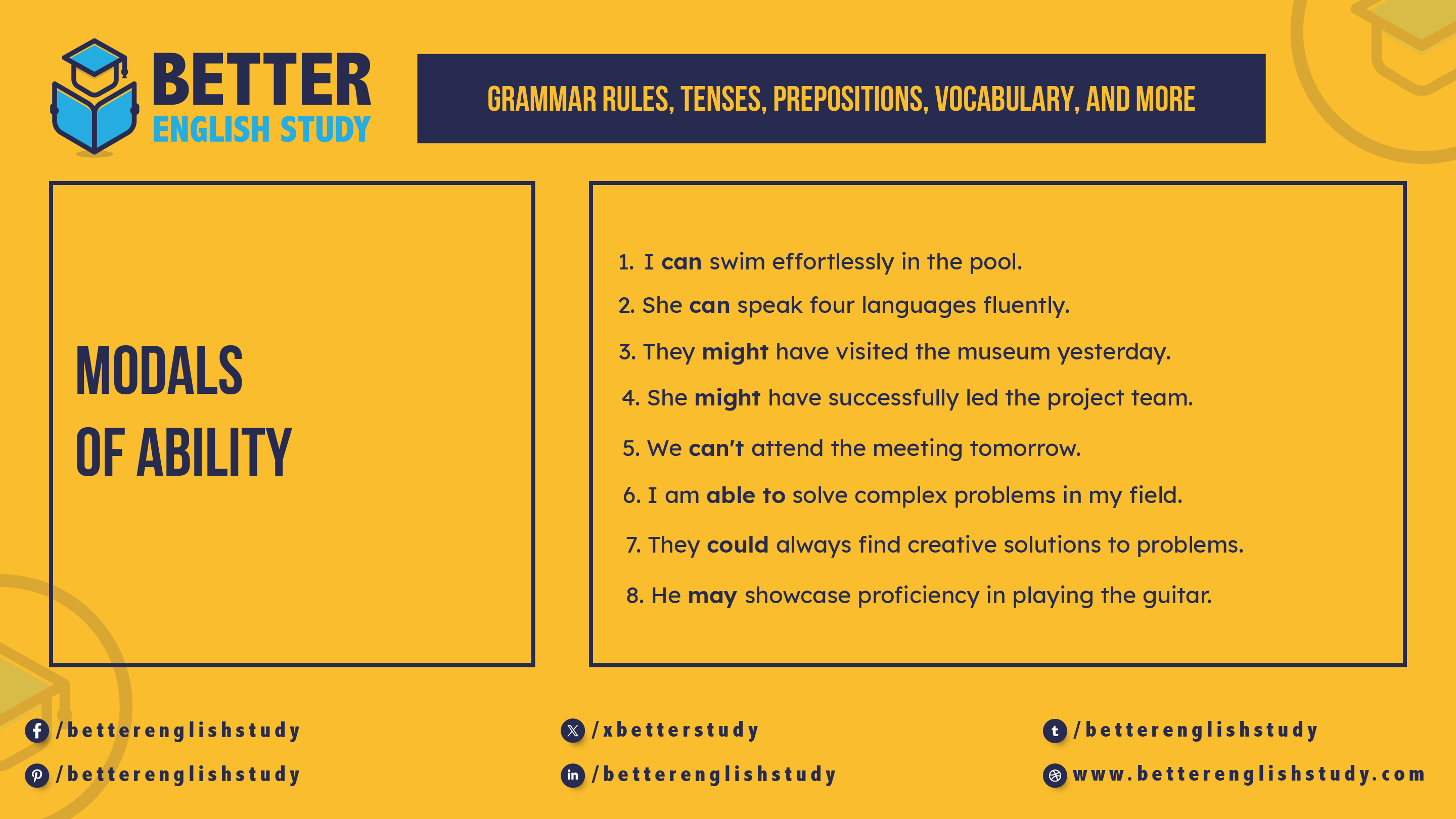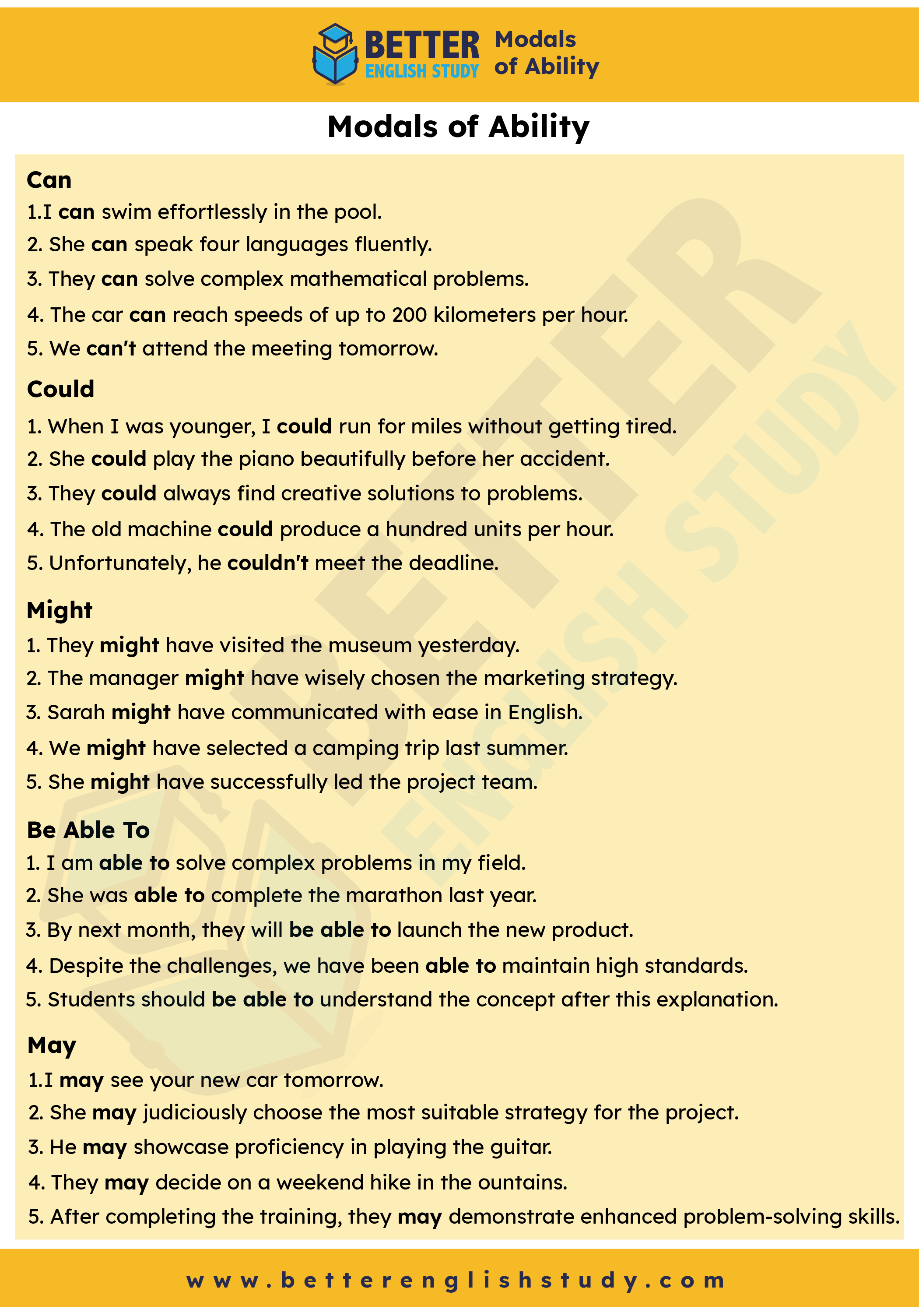
English language learners often find themselves navigating a complex web of modal verbs, each with its nuances and applications. Among these, modals of ability play a crucial role in expressing one’s capacity to perform various tasks. Imagine a world without the ability to convey what you can, could, may, might, or be able to do.
In this journey through modals of ability, we’ll unravel the mystery surrounding these verbs and provide practical examples to enhance your understanding. Whether you’re a beginner or seeking a refresher, let’s dive into the world of modals and master the art of expressing ability in English.
Meaning of Ability
Before delving into modals, it’s essential to grasp the concept of the ability itself. In language, ‘ability’ refers to one’s capacity or skill to accomplish a particular action or task. Whether it’s a physical skill, intellectual capacity, or the potential to achieve a goal, the expression of ability is fundamental in effective communication.
What are the Modals of Ability?
Modals of ability encompass specific verbs that aid in articulating one’s capability. The key modals for expressing ability in English are can, could, may, might, and be able to. Each of these modals carries its own shades of meaning and is employed in various contexts.
Sentences Using the Modals for Ability
Now, let’s explore each modal, providing clarity on their usage and context.
Can
Can is used to signify one’s ability or proficiency in a particular skill or activity at the current moment. For instance, when someone says, “I can run quickly,” they are conveying their present competence in running. The usage of ‘can’ emphasizes a real-time, existing capability, making it a go-to choice for articulating what an individual is capable of doing in the present context.
Examples:
- I can swim effortlessly in the pool.
Here, ‘can’ expresses the present ability of the person to swim.
- She can speak four languages fluently.
In this example, ‘can’ highlights the present linguistic ability of the person.
- They can solve complex mathematical problems.
‘Can’ emphasizes the current intellectual ability to solve mathematical problems.
- The car can reach speeds of up to 200 kilometers per hour.
This sentence showcases the mechanical ability of the car to attain a certain speed.
- We can’t attend the meeting tomorrow.
In a negative context, ‘can’t’ indicates the absence of the ability to attend the meeting.
Could
Could is the past form of ‘can’ and is used to express past ability or potential.
Examples:
- When I was younger, I could run for miles without getting tired.
‘Could’ here highlights the past physical ability of the person to run long distances.
- She could play the piano beautifully before her accident.
In this case, ‘could’ reflects the past skill of playing the piano.
- They could always find creative solutions to problems.
‘Could’ emphasizes the past intellectual ability to find innovative solutions.
- The old machine could produce a hundred units per hour.
This sentence illustrates the past mechanical ability of the machine to produce a specific quantity.
- Unfortunately, he couldn’t meet the deadline.
‘Couldn’t’ conveys the inability to meet a deadline in the past.
May
The modal verb “may” plays a pivotal role in articulating an individual’s ability to act, whether in the present or future. Beyond its conventional usage to express permission or possibility, “may” allows speakers to convey a sense of capability or potential in various contexts.
Examples:
- I may see your new car tomorrow.
In this instance, “may” is employed to indicate the speaker’s potential ability or intention to visit his friend’s car in the future.
- She may judiciously choose the most suitable strategy for the project.
Here, “may” is used to suggest the individual’s capability to choose the most effective strategy for the project, emphasizing a present or near-future ability.
- He may showcase proficiency in playing the guitar.
The use of “may” suggests the individual’s potential ability to demonstrate skill and fluency in playing the guitar.
- They may decide on a weekend hike in the mountains.
In this context, “may” indicates the group’s potential ability or choice to engage in a weekend hike. The sentence conveys the idea that the decision for a mountain hike could materialize in the near future.
- After completing the training, they may demonstrate enhanced problem-solving skills.
“May” in this context underscores the potential ability of individuals to showcase improved problem-solving skills after undergoing training, suggesting a future state of enhanced proficiency.
Might
Might is another modal that denotes a possibility or a less certain degree of past ability.
Examples:
- They might have visited the museum yesterday.
Here, “might” suggests the uncertainty or possibility that the group had the ability to visit the museum on the previous day.
- The manager might have wisely chosen the marketing strategy.
In this example, “might” conveys the possibility that the manager could make a wise decision regarding the marketing strategy in the past.
- Sarah might have communicated with ease in English.
The use of “might” implies the uncertainty or possibility that John had the ability to communicate effortlessly in English in the past.
- We might have selected a camping trip last summer.
In this context, “might” expresses the uncertainty or possibility that the group could choose a camping trip as their recreational activity in the past.
- She might have successfully led the project team.
Using “might” suggests the uncertainty or possibility that she had the ability to lead the project team effectively in the past.

Be Able To
The versatile verb phrase “be able to” serves as a linguistic powerhouse, allowing speakers to articulate not only their present capabilities but also their potential abilities in the future. This phrase transcends a mere expression of ability or permission; it encapsulates the essence of one’s capacity to undertake various actions.
Examples:
- I am able to solve complex problems in my field.
‘Am able to’ indicates present ability in this sentence.
- She was able to complete the marathon last year.
‘Was able to’ highlights the past accomplishment of completing a marathon.
- By next month, they will be able to launch the new product.
‘Will be able to’ conveys a future ability to launch the new product.
- Despite the challenges, we have been able to maintain high standards.
‘Have been able to’ emphasizes the ongoing ability to maintain standards.
- Students should be able to understand the concept after this explanation.
‘Should be able to’ expresses an expected ability after receiving an explanation.
Rules to Create Sentences With Ability
To construct sentences with modals of ability, it’s essential to follow a few rules:
- Verb Form: The verbs following ‘can,’ ‘could,’ and ‘be able to’ are always in the simple form. For example, “She can swim,” “He could solve the puzzle,” and “They are able to finish the project.”
- Present, Past, and Future Tense: Each modal can be used to express ability in different tenses. ‘Can’ for present, ‘could’ for past, and ‘be able to’ for present, past, and future.
- Positive and Negative: Modals can be used both in positive and negative sentences to convey the presence or absence of ability.
- Context Matters: Consider the context when choosing the appropriate modal. ‘Can’ is often used for general abilities, ‘could’ for past possibilities, ‘may’ for permission or possibility, ‘might’ for less certain possibilities, and ‘be able to’ for various tenses based on context.
Mastering modals of ability opens the door to effective communication in English. Whether expressing current skills, narrating past achievements, or contemplating future possibilities, the ability to use these modals accurately is crucial.
As you practice and integrate these modals into your language arsenal, you’ll find your capacity to express various facets of ability expanding. So, embrace the nuances, practice with diverse examples, and unlock the full potential of modals in expressing ability in English.
